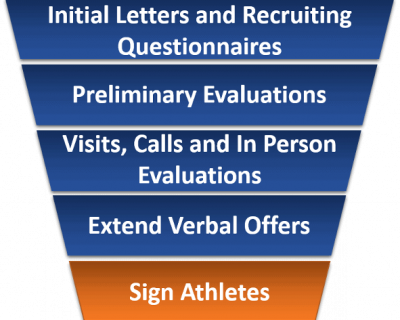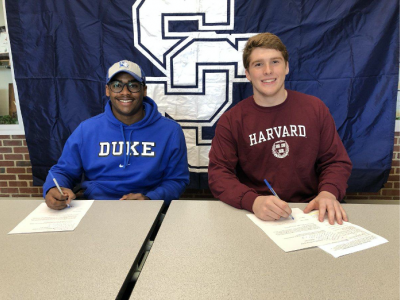By Steve Park, Trey Brown, Talia Roth, Melissa Sandoval Mullis and Clayton Finney
What is Recruitment?
The term recruitment refers to the processes in which a college employee or representative invites a high school student-athlete to play sports for their school. Recruitment can take the form and occur in many ways like face-to-face contact, phone class or texting, through mailed/email, or through social media. It’s important to remember that no athlete’s recruiting process looks the same. Some athletes start the recruiting process much earlier than others, and it really depends on the sport that the athlete plays.
Defining Important Terms
Before diving into the stories of many current student-athletes at Duke, let's first define some key terms related to recruitment. A contact happens at any time a college coach says more than hello in a face-to-face meeting with the student-athlete or their parents off of the college’s campus. An evaluation occurs when a college coach observes the student-athlete practicing or competing. A verbal commitment happens when a student-athlete verbally agrees to play sports for a college before he or she signs or is eligible to sign a National Letter of Intent. The commitment is not binding on the student-athlete or the school and can be made at any time. One of the biggest issues with early offers is that both the recruit and the coach can back out. Sometimes this puts athletes in a difficult position because their offer might be rescinded but because they had a verbal commitment they did not communicate with any other schools. Athletes can also be invited to visit the school, unofficially, without having an offer from the school. When a student-athlete officially commits they sign a National Letter of Intent, agreeing to attend that school for one academic year.
For most Division 1 and Division 2 sports, coaches can only start proactively reaching out to recruits June 15 after their sophomore year or September 1 of their junior year. But student-athletes can reach out to college coaches, however, college coaches just can’t respond until the rules say they can. During the recruitment process, college coaches typically follow specific steps which includes gathering a list of prospective athletes, sending out letters, questionnaires, invites, conducting evaluations, offering verbal commitments, and lastly signing athletes. What this means for athletes is that they tend to start out with a list of programs that would be a good fit for them and then slowly cut down the list based on their preferences and the interest that the college coaches show them. Athletes typically reach out to coaches, thank them for their letters and let them know they are interested in their programs. Once coaches want to begin to evaluate the athletes they will often get in touch with athletes and start calling their high school and club coaches for an evaluation or recommendation. Coaches may also travel to large tournaments or showcases where many of their recruits will be competing, or they will send athletes personalized invites to their own camps. Athletes will then begin to get scholarships and lock down commitments. Typically, the last step in the process is ensuring that each recruit that signs with a specific college meets eligibility requirements in terms of taking required courses, achieving a certain GPA, and earning certain scores on standardized exams.
Duke Athlete Interviews
Admissions for the men’s and women's basketball team, as well as the football team, is primarily handled by the Dean of Undergraduate Admissions for Duke. Admissions for the rest of recruits is handled by the other members in the office of Undergraduate Admissions, but all decisions are final. In terms of recruitment for Duke University, all student-athletes are expected to have similar recruitment experiences, however, each athlete has their own unique story. In the Duke Athletic Handbook on Recruiting, it is expressly stated that some of the procedures are different for football and men’s and women's basketball. For this reason, we spent time interviewing athletes of different men’s and women's teams at Duke and asked for their perspective and thoughts on their recruitment process. We are keeping the identities of these athletes anonymous for their protection and for full transparency. First, we interviewed a senior on the women's lacrosse team.
Q: What was your recruitment process like?
A: When I was recruited to Duke, there was no rule on committing on a certain time, so I committed during the summer in between my freshman and sophomore year in high school. Now, you can only commit after September 1st of your junior year.
I could only speak to coaches if I reached out first, coaches are not allowed to directly reach out, but there were many loopholes within the system to get around these rules.
To be eligible, the coaches told me I couldn't get any Cs, had to take at least 3 AP classes, and had to get a specific score on the ACT and SAT.
Q: Do you feel like the standard for your recruitment was different than other athletes?
A: While on campus for the official visit, the men's lacrosse team can take their recruits out to bars, drink with them, and show them a good time. When the girls have recruits on campus visiting, we can not take them out to show them a more realistic side of college life. There’s just such a different standard.
Next, we interviewed a member of the men's football team.
Q: What were the selling points from your coach on why you should attend Duke?
A: The great education that I would receive at a place like Duke was a big selling point. The coaches agreed to me receiving guaranteed playing time before I had signed my letter of intent or submitted an application to the school. This is definitely a common recruiting tactic that coaches used to try and lure players to their school.
Q: Have you compared your recruitment process to one of your teammates' recruitment process?
A: Yes, it’s crazy to see that the people who play at the same college as me were offered things such as starting positions or a better place to live at. Coaches will say just about anything to big-time recruits just to get them to come to their school and it could be totally different than someone else being recruited to the school at that same position.
After that we interviewed an international member of the soccer team.
Q: How has coming from overseas affected your recruitment process?
A: It’s harder to get noticed, and so I had to attend an ID camp. There are not many opportunities to play in front of the coaches if you are playing in a different country. Whereas it is true that some international players get the coach’s attention without these ID camps, it is still very rare and unless you constantly get contacted by the coaches and they show up to your games overseas, you should take the initiative and go to these camps.
Finally, we were able to interview a member of the men’s basketball team.
Q: Did your parents play a large role in your recruitment process?
A: Yes, I wanted them to be involved. Coaches would come to see my mom in her office, would text and call her. Through it all she always pushed Duke though. It's been my dream ever since I was younger to play for Coach K.
Q: Were you guaranteed a spot at the school before submitting your application?
A: So, this happens for a lot of the guys who come here. It’s trickier here because Duke is so prestigious, so they usually ask for grades. If you are the number one recruit in the class though, it literally doesn’t matter. There’s all sorts of slimy stuff going on behind the scenes. ‘Oh you’re guaranteed minutes if you come here’ or ‘Here’s this amount of money if you come here’.
Fact-Checking Duke Athletic Policy with Interviews
After gathering information from the interviews, we compared them with the rules and regulations listed on the Athletic Policy Manual. This allows us to directly look at how the coaches either obey or disobey the rules during the recruiting process.
1. Being guaranteed a spot at the school
Section IV(A)(1)(g) states that no applicant will be offered assurance of admission prior to consideration by the Office of Admissions. Coaches must be explicit in communicating with recruited students and their parents that the only valid offer of admissions is the admission letter from the Dean of Admissions. However, we could see that this isn’t the case for a number of “big-time recruits”. Coaches would say a lot of things to bring these athletes in, such as a starting spot, playing time, or “a better place to live at”.
2. Grades
Another notable feature of a Duke recruiting process is grades. The specific grades from either high school or standardized tests that a school requires can differ from school to school. There is also a certain number of AP courses one is required to take for Duke. For Duke Women’s Lacrosse, we can see that a prospective player “couldn’t get any Cs, had to take at least 3 AP classes, and had to get a specific score on the ACT or SAT”. This reflects Section IV(A)(1)(a) of the Athletic Policy Manual, where it is mentioned that a Duke student-athlete must be “able and willing to do the academic work required for graduation and to contribute appropriately to the Duke community”. Being a top academic school, it is not a surprise for Duke to have these academic standards for its athletes, as they too are students of the school. However, these specific grade restrictions do not seem to apply to top recruits.
3. Contacting Coaches
Regulations concerning the communication between the players and the coaches have changed over time. Until a few years ago, athletes were not allowed to directly talk to the coaches in several ways. For one, coaches weren’t allowed to directly call an athlete on any occasion and the athlete would have to call or schedule a time in which he/she would call. Back then, there were “lots of loopholes in terms of talking to coaches”. Now, there is a distinct period in which coaches could communicate freely with prospective Duke athletes. However, before September 1st of junior year, there should be no communication between the two parties.
4. Differing Standards Between Male and Female Athletes
Although it is not specifically mentioned in the manual, there seems to be a massive disparity between male and female athletes in terms of their visiting experience at Duke. For instance, during the official visit, the men's team can take their recruits out to bars, drink and generally have a good time outside of the school, while such luxuries are not allowed for women’s team players. Also, it is a violation of NCAA Bylaws and Duke University Regulations to provide a prospect with inappropriate entertainment during an official visit to campus, which includes providing access to establishments with a minimum age limit, and/or alcohol and drugs to prospects. Therefore, unless these recruits are above the age limit, Duke would be violating these regulations set by the NCAA.

